PC Engine build
-
@herb_fargus
Thanks for the info, I'll look into it. I tend to muddle through anything to do with Linux but usually get there in the end.@FlyingTomahawk
It's a setting in raspi-config.Go to 'boot options'.
Select 'Wait for network on boot'
select 'no'It should make a big difference (it has on all my builds at least), let me know if it improves things for you.
-
Thank you!
Will try this today after work. I'll also check the boot time. Keep you updated asap.
-
@ruckage said in [PC Engine build]:
I was initially hesitant as this is a working machine and they are fairly rare over here. I decided though that as it would need various mods to even get it working on a TV over here that I will convert it - however I'm being very careful so that at a later date it could be returned to an almost original state if needed.
A man after my own heart. Respect the classics! Not many of these Retro consoles left, so look after them :)
Always makes me worried when people tear apart old consoles just to put a Raspberry Pi in them. They are finite and only getting old (I know there are millions, but still). But its nice to see if someone does do this they do it in a way that the console can be restored if needed.
-
@ruckage now, if you really want to be ambitious you could look into Plymouth boot splashes... Though I've found on my pi 3 the boot time is so fast that the Plymouth bootsplash is disappointingly brief.
This is the Pacman one I did:
Unfortunately also with Plymouth there isn't really sound either.
-
@flyingtomahawk said in PC Engine build:
How did you do that?
You can do it via
sudo raspi-config(https://github.com/legotheboss/YouTube-files/wiki/(RPi)-Wait-For-Network-at-Boot).
@ruckage In addition to disabling Samba, you can also disable the Wifi and configure ES with Parse Gamelists only, this way ES will not re-scan the ROM folders on start. -
@mitu
Does disabling Wifi has the same effect as turning off network check at boot. Or is it recommended to deactivate both to speed things up? -
@flyingtomahawk said in PC Engine build:
Or is it recommended to deactivate both to speed things up?
If you don't use the Wifi, then I think you'll get a few seconds off in the boot time. I've looked at the service boot start time, using
systemd-analyze critical-chain; the outliers were the smbd/nmbd (samba) services, which for the dhcp IP address, which in turn waited for the wifi to come up.
You can try and do some tests on your own - disable/enable Wifi and/or Samba and run each timesystemd-analyze critical-chain(after rebooting) to see the boot times and the order in which services are started. -
@ruckage Can't wait to see what "theme" you come up with for this build
-
So back at home I gave it a try and here the results
First boot up
around 23 sec till boot video
28:45 sec till menuSecond boot up (wifi off)
around 16 sec till boot video
48:45 sec till menuThird boot up (wifi and network check off)
around 17:20 sec till boot video
23:38 sec till menuThe overall time hasn't improved by much but the boot video shows up lot faster now.
I don't use super fast SD cards or the like just regular stuff so maybe this is as fast as it goes. I also don't have 1000+ roms on it. Now I am also curious to know what else can be turned off to speed up the boot time.UPDATE
Retropie Shares removed, Samba uninstalled.
Getting random times. Sometimes fast sometimes a bit slower.8-9 seconds till boot video
15-21 seconds till menuI ain't braking any records here but it has become faster and that is good enough for me. Many thanks for the pointers.
Hope ruckage can cut off a bit more so I'll be following this discussion closely. -
Ok, that's pretty tight man. I'm thinking about using that as my intro splash screen.
-
I saw this the other day, and I loved the splashscreen Here. Sadly, I'm not a bomberman fan or TurboGrafx-16 fan, but this is well done.
-
@mrjordaaany said in PC Engine build:
@ruckage said in [PC Engine build]:
A man after my own heart. Respect the classics! Not many of these Retro consoles left, so look after them :)Always makes me worried when people tear apart old consoles just to put a Raspberry Pi in them. They are finite and only getting old (I know there are millions, but still). But its nice to see if someone does do this they do it in a way that the console can be restored if needed.
Yeah, for this one especially I didn't want to destroy it as it's much less common than other consoles (particulalrtly in UK) so the internals will be kept safe for the future and the only damage to the case will be a few drill holes - most people who mod these for RGB etc. cause much more damage to the cases than that so I don't feel guilty :) .
@herb_fargus said in PC Engine build:
@ruckage now, if you really want to be ambitious you could look into Plymouth boot...
I saw your PacMan boot a while back, I really like it. I don't think I'll try Plymouth for this build though, it does look interesting but also quite complicated and I've already made this build more complicated than I originally planned :D. Animated gif support would actually be a good option for the boot screen, I wonder if that's possible.
@mitu said in PC Engine build:
@ruckage In addition to disabling Samba, you can also disable the Wifi and configure ES with Parse Gamelists only, this way ES will not re-scan the ROM folders on start.
Thanks, I like to have the wifi on so i can access the machine easily if needed but once everything is completely setup it may not be necessary so I'll look into it. Setting ES to 'parse gamelists only' is a good tip if you have a lot systems and roms but for this build I'm not loading ES at all so it wouldn't have any impact.
@stuart2773 said in PC Engine build:
@ruckage Can't wait to see what "theme" you come up with for this build
I'm sorry to disappoint you but this build won't be using ES at all so it won't have a theme, all games will be launched by inserting my fake Hucards (I have enough plastic blanks to make 100 at least which will easily cover all the PC Engine games I'm interested in.
@flyingtomahawk said in PC Engine build:
8-9 seconds till boot video
15-21 seconds till menuI ain't braking any records here but it has become faster and that is good enough for me. Many thanks for the pointers.
Hope ruckage can cut off a bit more so I'll be following this discussion closely.That's a pretty good improvement, thanks for posting the different boot times as it gives a good indication of what changes make the most difference. Is it a pi3 or a pi2 you're using? The SD card can definitely make a big difference up to a point, you don't need a super expensive card as the SD reader is limited anyway but I've always found Sandisc Ultra to be a good affordable card with good performance (32gb is about £10 sold by Amazon).
-
Are you 3d printing the fake cards? And I assume they'll use NFC?
-
@sgtjimmyrustles They're lasercut and using NFC. Hucards are the size and shape of a credit card (only thicker) so it was relatively cheap to have them cut which makes this feasible for a large number of games (more details in my post a few days ago https://retropie.org.uk/forum/topic/14989/pc-engine-build/16 )
-
@ruckage
It's a Pi3 with a Mausberry switch.
I'll definitely have a look at different SD cards to see if I can get the boot time down a few more seconds. -
I just made what I think will be the finalised Hucard design, it's come out pretty well. There is a slight bulge on the back of the card where the NFC label is placed under the rear hucard label but there isn't much I can do about that as the NFC label has to go somewhere.
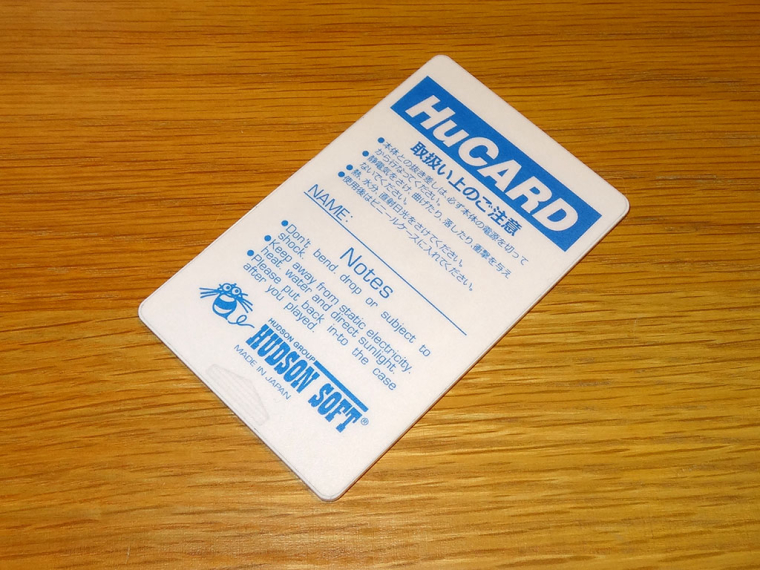
The art on the hucards will not be accurate in most cases, finding high quality scans of hucards is difficult and in many cases is just text which is a bit boring so I'm using the cover art as the hucard art. Also the artwork on real hucards varies in size as the pcb (the black area) varies depending on the game size. For mine I'm sticking to an artwork size that is as large as possible while still being fully visible when inserted into the console.
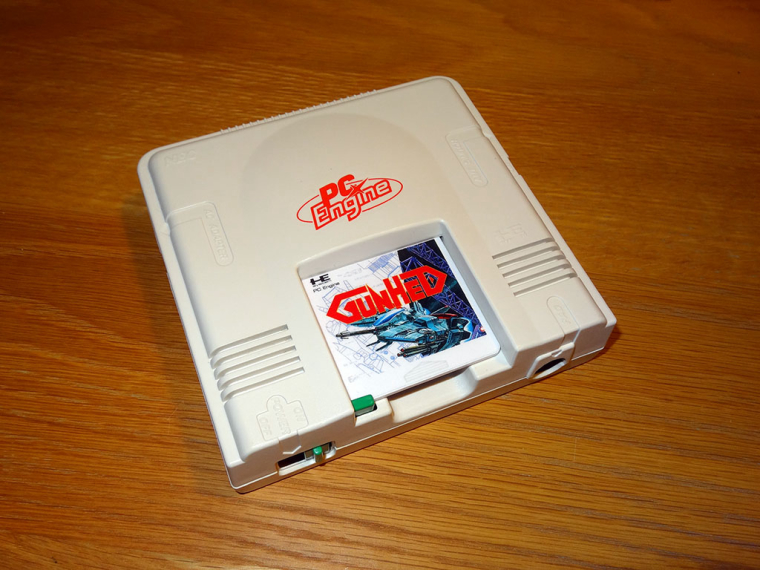
I'm also making cases for these complete with a custom made insert to really add the finishing touch, I'm really pleased with the way they look.
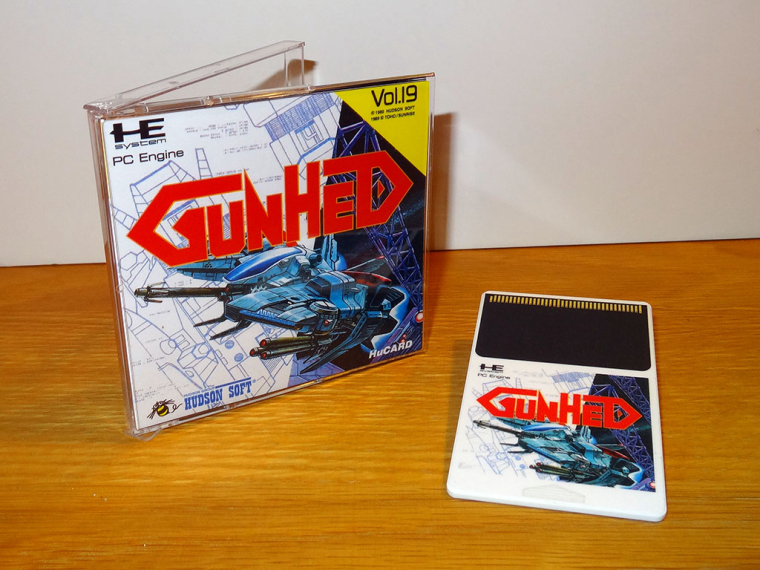
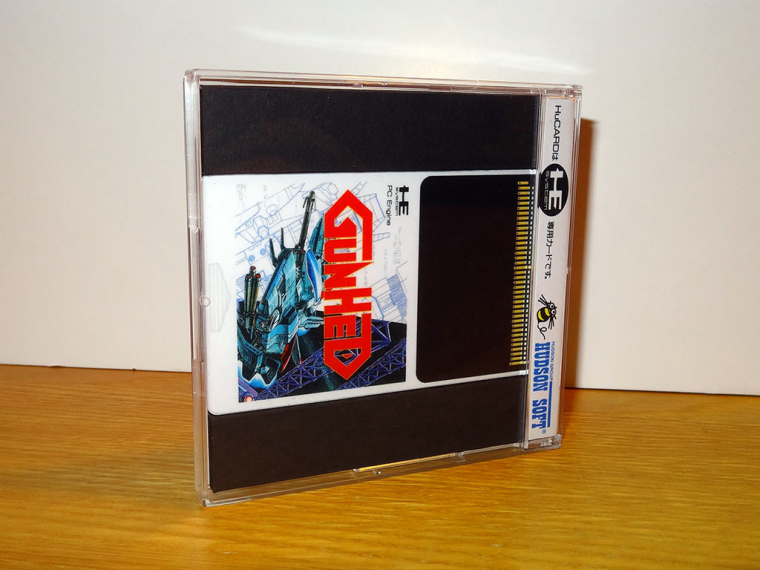
You can't see in the photos but at the top of the spine I have a colour coded genre similar to TurboGrafx 16 boxes, these I think will cover most games.
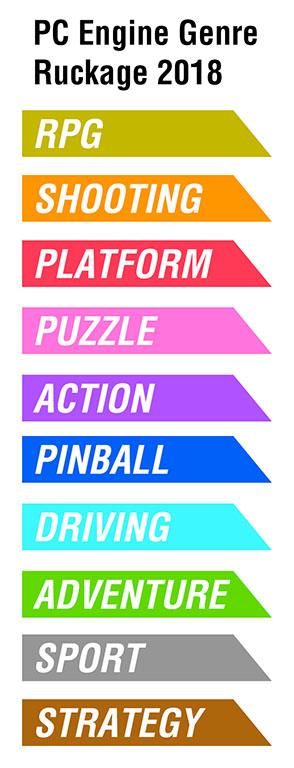
-
Funny you show this game. Just saw it yesterday at Hard Off for 12000 yen. So you just saved yourself a big amount of money.
A guy that I used to have contact in Yokohama owns the complete Shmups collection for PCEngine and some were REALLY expensive he said.
Still I don't understand how you gonna run these games without ES. Is there a different software you gonna use? Can you explain more details?
-
@flyingtomahawk Kinda going off memory here from the NESPI project. But what would happen is he would insert the "HuCard" into the slot and underneath would be the NFC reader. When he presses a button or toggle, the reader will read the rom on the NFC sticker, pass the rom along to RA which would load it in the proper emulator.
-
@flyingtomahawk said in PC Engine build:
Funny you show this game. Just saw it yesterday at Hard Off for 12000 yen. So you just saved your self a big amount of money.
A guy that I used to have contact in Yokohama owns the complete Shmups collection for PCEngine and some were REALLY expensive he said.
Still I don't understand how you gonna run these games without ES. Is there a different software you gonna use? Can you explain more details?
Yeah some of the games for PC engine are stupidly expensive, i'd never be able to afford most of the genuine hucards so It will be cool to have a collection with all those rare games (even if they are just pretend :D )
@lilbud is very close with how it works, mine is bit different to the nespi as everything happens automatically when the console is switched on.
I've modified autostart.sh and have removed emulationstation from it (this means that ES isn't launched) and in it's place I call a python script. The python script reads the nfc (using nfcpy library) which contains the rom name and launches the game using 'Runcommand' which is exactly the same way ES launches the games as well. -
~~So how do you get those games/roms into the hucards? Where did you get the python script from to let it read that game data and then run them?
I am not familiar with the NESPI build. So forgive me the questions.~~
Never mind. I'll just keep watching this build and see how it goes. I probably will never build anything close to it so no need to know everything behind it.
Contributions to the project are always appreciated, so if you would like to support us with a donation you can do so here.
Hosting provided by Mythic-Beasts. See the Hosting Information page for more information.